Search Results
Showing results 81 to 100 of 135
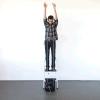
Falling Rhythm
Source Institutions
Listen to the beat of gravity. By taking two strings with weights tied to them at different, yet uniform intervals, you can hear the uniformity (and rhythm) of gravity's accelerating pull.
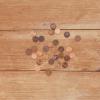
Radioactive-Decay Model: Substitute coins for radiation
Source Institutions
Get a roll of pennies, throw them on the ground, then remove those that only show tails, and repeat with the ones left over.
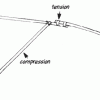
Garden Poles
Source Institutions
In this activity, learners build large-scale structures and cantilevers in a series of "building out" challenges with garden poles and tape.
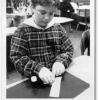
Cylinders and Scale
Source Institutions
In this activity, learners investigate the relative growth of lengths, areas, and volumes as cylinders are scaled up.
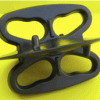
Air Pressure and Dent Pullers
Source Institutions
In this activity, learners simulate Otto von Guericke's famous Magdeburg Hemispheres experiment.
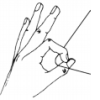
Rotating String Shapes
Source Institutions
In this group activity, learners make multi-sided polygons with string.
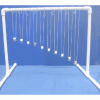
Pendulum Snake
Source Institutions
In this physics activity, learners assemble and/or investigate a pendulum "snake." Several large steel hex-nuts are suspended on strings of successively increasing length to form a series of pendulums
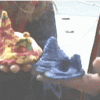
To Topo Two
Source Institutions
In this activity, two groups of learners create two separate landform models out of clay (mountains and valleys).
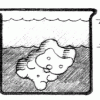
Gummy Growth
Source Institutions
In this activity related to Archimedes' Principle, learners use water displacement to compare the volume of an expanded gummy bear with a gummy bear in its original condition.
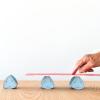
Non-Round Rollers
Source Institutions
Wheels aren't the only things that can "roll" objects that are placed on top of it. Make non-intuitive shapes from cutouts and a compass to demonstrate this.
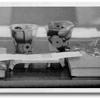
Paper Bridges
Source Institutions
In this activity, learners build bridges using paper and explore how much weight each bridge design can support.
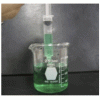
Sizing Up Temperature
Source Institutions
In this activity, learners explore Charles' Law in a syringe.
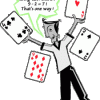
Fantastic Four: A Math Card Game
Source Institutions
This is a game that is sure to sharpen players' basic math skills. Players must use four randomly selected numbers to create an equation that equals a fifth number.
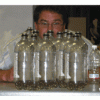
A Mole of Gas
Source Institutions
In this two-part activity, learners use everyday materials to visualize one mole of gas or 22.4 liters of gas. The first activity involves sublimating dry ice in large garbage bag.

Life Size: What's in a microbe?
Source Institutions
In this activity on page 3 of the PDF, learners visualize the relative size and structural differences between microbes that have the potential to cause disease.
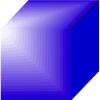
Scaling Cubes
Source Institutions
In this activity, learners explore scale by using building cubes to see how changing the length, width, and height of a three-dimensional object affects its surface area and its volume.
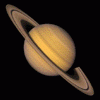
Build a Solar System
Source Institutions
In this activity, learners make a scale model of the Solar System and learn the real definition of "space." Learners use the online calculator to create an appropriate scale to use as a basis for thei
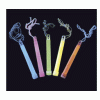
Illuminations on Rates of Reactions
Source Institutions
In this activity, learners investigate the speed of chemical reactions with light sticks. Learners discover that reactions can be sped up or slowed down due to temperature changes.

Secret Codon
Source Institutions
In this activity, "write" a secret message in genetic code as beads on a string.

A Cubic Foot Per Second
Source Institutions
In this activity, learners measure and calculate the amount of cubic feet various containers contain. Next, learners investigate cubic feet per second (cps), by carrying jugs in one second.
